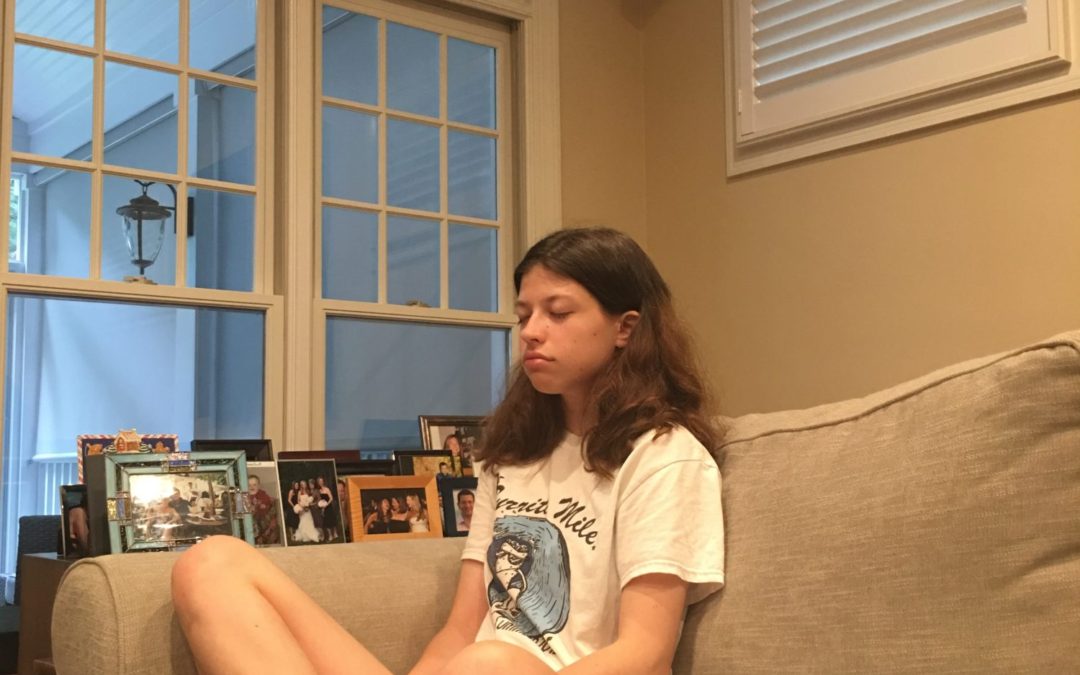STRESS. Everyone has experienced it and nobody likes it. In fact, 20% of teenage males and 30% of teenage females have been diagnosed with an anxiety disorder– that’s over 6 million Americans (National Institute of Mental Health). Sometimes it feels as though we can’t control the tasks piling up on our to-do list, whether it be a homework assignment, a term paper, or a budget presentation in front of literally all of your coworkers. It sucks, but that doesn’t mean that we can’t do anything about it. In fact, I’m here to tell you –through the power of the internet and a couple of people who are way more experienced than I — that there are many tools to help us young adults get through even the worst of it. Some of it may sound a bit impractical, but I promise you’ll see results that will help reduce the weight of whatever may be burdening you (meditating has helped me get through many stressful episodes and I’m proud to say I feel extremely ready to tackle the day even after a guided session of only 15 minutes).
Recently on the Time4Coffee Podcast, Andrea (our wonderful and talented host) interviewed two people with enough knowledge on mindfulness and emotional wellness to conquer the world: Hugh Byrne and Ulrik Nerløe. Hugh, originally from England, has been training in mindfulness meditation for 30 years and teaching the method for nearly 20. He has written a successful book on the power of mindfulness which can be found here. Ulrik is a native of Denmark and after an unfulfilling start to his career, founded an organization called Unified People, which works with individuals in leadership positions to “bring their heart to work” and be more aware of their needs and those of their employees. In his spare time, he too managed to write an insightful book on how to reduce stress through being present in the moment; his book can be found here. For more information on either of these inspiring people, check out their respective episodes on our podcast!
Shameless self promo aside, these two interviews really spoke to me. I finished my junior year of high school in June, and while many of you Java Junkies are in college, let me just say it was pretty difficult (for all of you who may be younger than me, what I’m about to tell you might be a little intimidating). Not only did I have to deal with multiple AP classes, ACT prep, applications for internships, starting the college search and rocky friendships, I was also diagnosed with mild anxiety at the beginning of the school year. Going through any of this is definitely stressful, but when you add the extra spice of being naturally anxious, things get all the more tricky. I started going to see a therapist on weekends, but sometimes an anxiety episode would happen in the middle of the week because of a big test or presentation and I’d have to wait a few days to even talk about it with someone. People kept telling me that it was normal because junior year of high school is “always terrible” and what I was feeling was to be expected. I knew that wasn’t acceptable and finally hearing what Ulrik and Hugh had to say– after the craziness that was this past school year– made me feel that there are ways to manage anxious or depressed feelings effectively.
What first stood out to me was something that Ulrik talked about– the idea that every emotion in life boils down to how much “life energy” you have. Life energy is the concept of how interactions with others, workloads, and other events affect how you feel. If you have a tense, irritating conversation with someone, according to Ulrik, they are in fact, draining your “life energy” and if you watch an adorable video of corgis frolicking in a park, that will recharge your “life energy”. Emotions are, therefore, no longer uncontrollable episodes with the power to derail your day, but rather they can be measured on a scale and tweaked accordingly. Someone wants to talk to you about their dentist appointment in excruciating detail? Subtract 20 life energy points! But once that experience ends, you can go back to your desk and text with a close friend. Add 30 life energy points! Conceptualizing anxious or stressful feelings in this way may help to make almost anything unpleasant in your life more manageable.
The next thing that stood out to me may seem rather obvious. It’s the idea that your environment and the people in it can heavily influence your behavior and feelings. Ulrik Nerløe puts it simply: “If you spend a lot of time with negative people, you will become negative. If you spend a lot of time with positive people, you will become positive.” Additionally, he brought up the point that when people influence your energy/mood, they are often doing so unconsciously and not maliciously. People in our lives, especially loved ones, usually don’t mean to make you feel bad, but it can still happen unintentionally. This is when being reflective in the present moment comes in especially handy. It’s nearly impossible to influence the behavior of others, so doing some internal reflection can help you determine the reason why you’re feeling a certain way. If an uncommunicative significant other is blocking your otherwise upbeat energy or making you feel down, it’s a good idea to reflect on what’s happening and make a choice that will bring positive energy back into your life. That may require you to have a conversation with this person, or if worse comes to worse, even ending your friendship with them. That’s because it is crucial to always put your well being first. Living your life on autopilot without consciously contemplating things in your life is not healthy in the long term. Ulrik made it quite apparent to me that it’s important to live life purposefully and make decisions in the present and not wait for the future to just happen.
With all this said, it can be hard to make it an immediate habit to be reflective and mindful on a daily basis in multiple situations. One way to create this habit and take a break from the fast paced or tedious work day is to meditate. There are many different types of meditation, but the one that both Ulrik and Hugh spoke about was mindfulness meditation. Mindfulness, for those who may not know, is the practice of consciously acknowledging your physical environment and emotions. Sounds easy, right? The quick answer is yes it is AND it also takes discipline and practice. According to Hugh Byrne, a scheduled routine of meditating for at least 15 minutes a day can take up to 8 weeks to see results for those with anxiety, depression or chronic stress. That’s less time than a new episode of Riverdale! Fear not, though. Those who meditate regularly are known to see amazing improvements, relatively quickly with some people’s symptoms reduced to a fourth of what they were originally!
Personally, what Hugh mentioned next was particularly interesting to me. He said that anxious feelings almost always originate from a single negative thought. And through a session of mindfulness meditation, we can learn to focus on that thought and actively tell ourselves how we can conquer the negativity. Through this process, you can choose — even though it may not seem like it– to dismiss the anxious thought or let it spiral into something larger. While that may sound slightly daunting, I promise it’s not. In a world where stress is second nature, it’s important to be aware of how you’re feeling and treat yourself kindly. A quick meditation session may be the way to do just that!
Even though these two interviews are not about careers per se, the usual Time4Coffee focus, it’s our belief at T4C that getting your dream job is pretty pointless if you’re feeling depressed, anxious and miserable about life otherwise. These days it feels like everyone under the age of 25 is running a marathon just to achieve a stable career. Between college applications, coursework, and entering the ever competitive workforce, it’s no wonder chronic stress and anxiety rates are at an all time high; between August 2016 and January 2017, American stress rates rose from a 4.8 to a 5.1 on a 10 point scale created by the American Psychological Association (this is the sharpest increase in the scale’s decade long history) (APA). Hearing from two experts about numerous ways to decrease these negative feelings/symptoms is significantly helpful! I’ve already started meditating daily and I am way more in touch with how I’m feeling. Remember to start keeping track of your “life energy” and try to be more aware of how your environment and/or interactions with others are affecting your mood and sense of well being. All of us at Time4Coffee are on the path with you and want to continue to support you along the way!
Tweet us @Time4CoffeeLLC and let us know how you recharge your life energy!
Got a LATTE on your mind?
Try some guided meditation! Check out Hugh’s T4C episode to meditate with Andrea and the Java Junkie crew (it’s a great place to start) or check out https://insighttimer.com (available on the App Store and Google Play) to participate in thousands of live and prerecorded meditation sessions, some are even led by Hugh! And if you’re feeling like you really need to get away, Hugh is also leading two meditation retreats to Greece and Cuba in 2019! You can find more info about these two relaxing excursions on his website: www.hugh-byrne.com.
Submit your review | |


